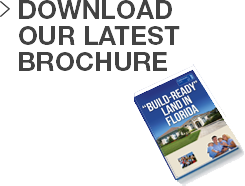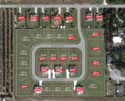How has the homebuilding market been affected by the recession?
The building industry in Florida remained largely stagnant for several years after the housing crash of 2007. Now, however, the real estate market has begun to recover and individuals are deciding once again to invest in new home construction. Housing starts have already reached 60% of their 1990 levels, representing a significant increase in demand.
UK and international citizens considering the construction of a second or holiday home in Florida should understand the advantages offered by the two primary construction methods there: concrete block and timber frame.
Concrete block construction in Florida
Older homes in Florida are often constructed with concrete block. Such a home does provide residents with excellent sound control, as the blocks making up the walls tend to absorb sound waves. People also appreciate the "solid" feel that a block home imparts, as well as its termite resistance. In addition, concrete provides a home with thermal mass. While this is a decided advantage in a cold climate, in Florida, it means that block homes without adequate overhangs may overheat in the warmer months.
In Florida's subtropical climate, block houses can present significant drawbacks. This explains why much new home construction in the past 20 years has used the timber frame method instead. Since concrete block cannot breathe the way lumber can, the interior of block houses can develop a clammy feeling. If ventilation needs are not fully met, these houses may also promote mould growth.
Timber frame construction in Florida
When timber frame construction was new, it represented such a radical departure from typical building methods that critics questioned the strength and durability of the resulting buildings. As timber frame homes passed the test of time, however, they became a widely adopted building technique in the United States, a nation with millions of acres of forests able to provide the lumber required.
A timber frame building consists of wooden beams and boards in various sizes nailed or screwed together to create a strong structure. Because the walls in such a structure are not solid as in concrete block construction, they can be filled with insulation that will help the house to hold the cool temperatures created by air conditioning, a must in Florida's warm, humid climate. Timber frame homes tend to be drier on the inside than concrete block ones; this creates a healthier indoor air environment, which is particularly important for individuals suffering from certain respiratory conditions.
Most Florida builders use timber frame construction; it can actually be difficult to find a builder willing to work in concrete block. In part this is because of cost considerations; a timber frame house is substantially more affordable than a concrete block house of the same dimensions. Another factor to consider is the fact that the walls of a concrete house have a larger physical footprint than their counterparts in an otherwise identical timber frame building. The result is that the timber frame home will have more usable interior space, a significant benefit for homeowners.
Timber frame construction is a dominant building technique in Florida's hurricane areas; even block homes in these regions have timber-frame roof construction.
With housing demand in Florida in a strong recovery, UK citizens looking to invest in new homes would do well to consider timber frame construction in areas such as Tampa, Miami, Jacksonville, and Orlando.













